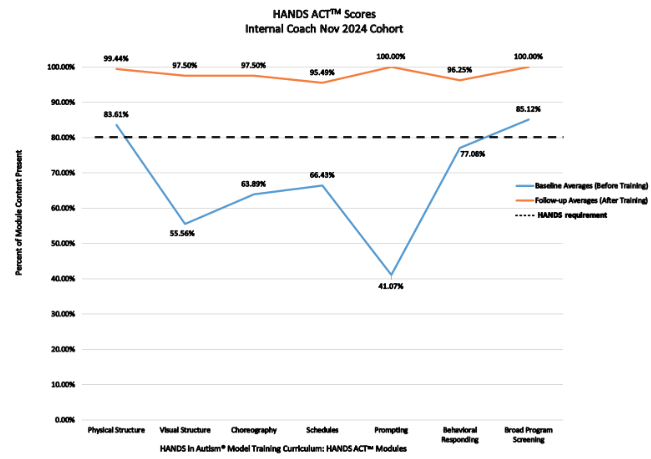Local provider teams participated in a multi-session Provider Pilot series focused on foundational, evidence-based practices to enhance behavioral and environmental support systems. This pilot served as a foundation for developing an internal coaching model aimed at increasing retention and expanding access to certified coaches within local provider organizations.
Selected participants from the pilots were invited to join the Foundational Coaching Cohort, a structured, multi-phase process using a “train-the-trainer” approach. Participants engaged in three progressive phases: (1) Implementation – training in core practices, (2) Intervention – developing fidelity in coaching and feedback, and (3) Coaching – peer mentorship and sustainability practices. Training included participation in the HANDS ECHO online series, case presentations, self-paced modules, and submission of implementation products for review.
The initiative emphasized a Community of Practice (CoP) model, incorporating intensive monthly training and mentoring, ongoing peer-to-peer learning, and interactive team engagement. A structured micro-credentialing system tracked progress and provided motivation through formal recognition, fostering workforce development and sustainable implementation.
This model, informed by national and state-level consultation, aligns with early intervention and autism-specific services, and demonstrates scalable potential. Internal coaches trained within their own organizations build capacity by training additional staff, amplifying service quality and reach. Cost-benefit analyses support the model’s long-term value through its “pay-it-forward” design and its positive impact on service delivery standards.
We want to celebrate the team at KCARC in Vincennes for their dedication to this project.
The graph shows the HANDS ACT™ scores for the Internal Coaching Cohort(KCARC team). It compares the baseline averages (before training) with the follow-up averages (after training) across different modules of the HANDS in Autism® Model Training during our Foundational Internal Coaching Cohort


